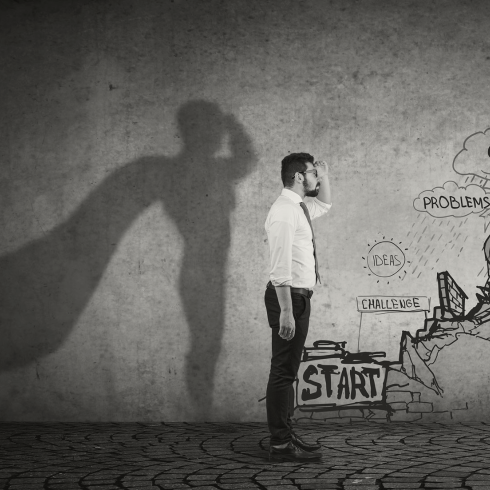
Why Does God Allow Suffering?
BY FR. ROBERT SPITZER S.J., PH.D.
INTRODUCTION
Christians often say that God, in His unconditional love, redeems our suffering. But one might well ask the question: why does God allow suffering to occur in the first place?
If God intends to redeem every aspect of suffering in His unconditional love, why didn’t He simply eliminate the possibility of suffering so that we could avoid pain—and He wouldn’t have to redeem it? Why not nip the entire suffering business in the bud—at the beginning of the world?
As will be seen, there are several reasons why God would allow suffering to occur in the world. All of them, according to the Christian view, would have to be linked to the advancement of love.
In this article, we'll look at suffering caused by humans and suffering caused by nature. Finally, we will discuss five opportunities found in the suffering caused by our imperfect world.






DOES GOD CAUSE SUFFERING?
If God is unconditional love, He would not directly cause suffering (except to impede those headed toward imminent self-destruction). Furthermore, if He allows suffering, He does so to advance love and strengthen His invitation to eternal, unconditional love.
Well, then, if God does not directly cause suffering and is therefore only an indirect cause of suffering, what or who are the true direct causes of suffering? There are three major sources. The first two are not related to our identity decisions, and the third is.
WHERE DOES SUFFERING COME FROM? THE FIRST 2 SOURCES
The two sources extrinsic to our identity decisions are:
- Suffering caused directly by human agents
- Suffering caused by natural forces
There are many nuances and combinations of these two sources of suffering. For example, a preventable disease such as leprosy (a natural cause) is not prevented or delimited by a particular country in order that tax money can be used to incite a new war (a human cause); or a tsunami (a natural cause) hits a particular country, but the country next to it decides not to use easily accessible resources to help because the victims are thought to be troublesome or unworthy (a human cause).

Many forms of psychological suffering are attributable to such combinations. For example, a person might feel depressed because of a chemical imbalance (a natural cause), which causes him to be marginalized by people who are fearful of his peculiar conduct (a human cause), which, in turn, exacerbates his depression and its physical symptoms.
WHERE DOES SUFFERING COME FROM? THE THIRD AND FOURTH SOURCES
The third source of suffering is a result of the intentional or unintentional decisions we make about our identity, purpose in life, and happiness along the stages of life’s way (e.g., a comparative identity or a contributive identity; a decision to be fundamentally autonomous or interpersonal; etc.).
These identity decisions define happiness and life purpose for us, and those definitions, in turn, determine whether we believe ourselves to be happy or unhappy, purposeful or unpurposeful, worthwhile or un-worthwhile, etc.
According to Jesus, God does not want anybody to suffer. Indeed, He should be likened to the most compassionate and affectionate of parents (Abba—the father of the Prodigal Son), who would gladly suffer in the place of his/her child but realizes that this child must make her own decisions and must deal with the challenges of life as a free human agent.
We must remember that God suffers with everyone who suffers and intends to redeem every scintilla of suffering in His providence for all eternity. Indeed, God the Father sent His only begotten Son into the world to suffer with us and for us—so that He could be a companion with us in our suffering and bring us to our eternal salvation.
God may allow suffering to occur in the world (for the reasons mentioned below), but His intention is to transform it into love. If He does not do this now, He might do it later; if He does not do this later in this world, He may do it in the eternal world, which is to come. The key idea to remember is that God has an eternal perspective and that He will transform all suffering into love for all eternity.

7 SPONTANEOUS PRAYERS FOR SUFFERING
FREE DOWNLOAD OF FR. SPITZER'S PRAYERS FOR SUFFERING TO CARRY WITH YOU IN TIMES OF DIFFICULTIES.
WHY DOES GOD ALLOW SUFFERING CAUSED BY NATURE?
It is somewhat easier to understand why God would allow suffering to occur through human agents than it is to understand why He would allow suffering to occur through natural causation. After all, it would seem that if God created the natural order, He could have created it perfectly—so perfectly that there would be no possibility of human suffering. He could have created each human being in a perfectly self-sufficient way so that we would have no need. Or, if we had need, He could have created us with a perfect capacity to fulfill those needs within a world of perfectly abundant resources.
So why did God create an imperfect natural order? Why did He create a natural order which would allow scarcity, earthquakes, volcanoes, and tsunamis? Why did He create a natural order which would permit vulnerabilities within the human genome that lead to blindness, deafness, or muscular degeneration? Why did He create a natural order which would permit debilitating diseases?
The brief answer lies in the fact that a perfect natural order would leave no room for weakness and vulnerability, yet weakness and vulnerability induce many positive human characteristics, perhaps the most important human characteristics, such as the five opportunities outlined in the next section (identity transformation, natural virtues, compassionate love (agapē), interdependence and human community, and the possibility of contributing to the kingdom of God).
This list of characteristics represents the noblest of human strivings, the propensity toward greater civility and civilization, and glimpses of perfection, which is unconditional and eternal by its very nature. Though weakness and vulnerability seem to undermine human potential, they very frequently detach us from what is base and superficial so that we might freely see and move toward what is truly worthy of ourselves, what has truly lasting effects, and what leads us to our true destiny—eternal and unconditional love with Him.

ST. PAUL’S DELIGHT IN HIS WEAKNESS
We may turn for a moment to Saint Paul’s insight in 2 Corinthians 12:8-10:
“Therefore, I was given a thorn in my flesh, an angel of Satan, to beat me, to keep me from getting proud. Three times I pleaded with the Lord to take it away from me. But he said to me, “My grace is sufficient for you, for my power is made perfect in weakness.” Therefore, I will boast all the more gladly about my weaknesses, so that Christ’s power may rest on me. That is why, for Christ’s sake, I delight in weaknesses, in insults, in hardships, in persecutions, in difficulties. For when I am weak, it is then I am strong.”
—2 Corinthians 12:8-10
Paul probably had a physical malady (possibly progressive blindness), which caused him to experience a loss of power and autonomy, yet he felt that his power had increased.
The power about which he is speaking here is love—a love that forced him to make significant changes in his life and identity and which drew him toward greater virtue, interpersonal relationship, compassion, community, and zeal. His power is truly perfected by weakness, which reveals why God would create a natural order with intrinsic imperfections that could cause genuine suffering.
WHY DOES GOD ALLOW SUFFERING? SUFFERING AS THE PATH TO VIRTUE
Since the time of Jesus, Christians have advocated that suffering is an indispensable path to virtue—and, therefore, an indispensable means for solidifying and establishing our eternal character and identity. Christians have not made this suggestion cavalierly but rather compassionately within the context of following the example of Jesus.
Christians have spent themselves trying to alleviate suffering, encouraging trust and hope in God—while helping those who “find life burdensome” to seize the opportunity within it.
Speaking of these opportunities, it now remains to explain how an imperfect natural order—and the suffering it produces—can be one of the most powerful opportunities to achieve identity transformation, the natural virtues of fortitude and temperance, and the supreme virtue of love (agapē). The imperfect natural world (and all forms of suffering) also provide the opportunity for human collaboration toward the common good as well as the pursuit of the kingdom of God.
As we shall see, suffering is indispensable (for most of us) in achieving our highest happiness, fulfillment, dignity, and destiny. Suffering is also indispensable for achieving our contribution and legacy for the common good and the kingdom of God.
Though life would be less painful and difficult without suffering, it would also be less meaningful, loving, just, good, and transcendent. Our temporary immersion in an imperfect natural order is the perfect pathway to the eternal and perfect order of unconditional love.
FIVE OPPORTUNITIES OF SUFFERING CAUSED BY OUR IMPERFECT WORLD
We now discuss the five opportunities of suffering caused by our imperfect world:
- The opportunity for identity transformation
- The opportunity for natural virtues
- The opportunity for love (agapē)
- The opportunity for a common cause toward the common good
- The opportunity to build the Kingdom of God
IDENTITY TRANSFORMATION
Our dominant view of happiness becomes our purpose in life, and if we pursue that purpose for a long enough time, it becomes our identity—who we are—our second nature.
It cannot be said that human beings require suffering in order to move from the more superficial levels of happiness/identity to the higher (more pervasive, enduring, and deep) ones. However, this more positive impetus to move toward a more pervasive, enduring, and deep identity can be greatly assisted by emptiness, weakness, and vulnerability.
In my life, I have seen how powerful the lower levels of identity can be. Yet, I truly desired higher levels of happiness/identity. Though this vision was quite powerful in me, I found myself transfixed by the lower levels—almost unable to move beyond them. This is where the “power of emptiness, weakness, and vulnerability” came into my life. Experiences of my physical limitation (particularly progressive blindness starting at the age of 31) broke the spell of the unmitigated pursuit of ego, status, and power.

I had a genuine Pauline experience of having to look at life anew, to look for a more pervasive purpose in the face of a loss of power, and to reexamine what I was living for in light of a loss of control. I had to become more dependent on God, trust in His ways, and trust more radically in His logic of love.
Thank God for weakness; thank God for the imperfect natural order which gave rise to those weaknesses. Without them, I would have been unqualifiedly locked into my addiction to ego, status, and power—what an emptiness, what a frustration, what unhappiness! The irony is that weakness and suffering helped me overcome the underliving of my life and the underestimation of my dignity.
IDENTITY TRANSFORMATION AND THE ANTICIPATION OF DEATH
This liberating power of suffering is not restricted to physical or psychological weakness. It also applies most poignantly to the anticipation of death.
As many philosophers have noted (both those coming from a transcendental perspective (such as Karl Rahner and Edith Stein) and a pure naturalist perspective (such as Martin Heidegger and Jean-Paul Sartre), death produces a psychological finality that compels us to make a decision about what truly matters to us.
Death might be the best gift we have been given because it calls us to our deepest life-definition and self-definition and—in the words of Jean-Paul Sartre—to the creation of our essence. If we believe in an afterlife, we take this authentic self-definition (say, love) with us into our eternity. But even if we do not believe in an afterlife, death still constitutes an indispensable gift of life, for it prevents us from interminably delaying the creation of our essence.
In light of death, the choice of one’s fundamental essence (say, love) becomes transformative and “life-giving.” Death gives life—an authentic, reflective, and free life through a more pervasive, enduring, and deep purpose.
NATURAL VIRTUES
Weakness and vulnerability (arising out of an imperfect natural order) are the conditions necessary for two of the cardinal virtues: courage and self-discipline. Notice that these virtues define our character precisely because they are chosen in the midst of adversity.
This is particularly evident with respect to courage. Ironically, an imperfect natural order (which gives rise to the real possibility of injury or death) not only gives rise to the possibility of courage but also to that courage lending existential weight (and therefore dignity) to our choice of the honorable ideal.

While courage is the pursuit of virtue against the possibility of pain, self-control is the pursuit of virtue through the avoidance of destructive indulgence in pleasure and passion.
Many philosophers have recognized that an unmitigated pursuit of pleasure can interfere with or even undermine the pursuit of what is most noble, most pervasive, and most enduring.
Yet these pleasures are not intrinsically evil (i.e., food is obviously good for human beings, but an unmitigated pursuit of food to the point of gluttony will likely undermine, or at least slow down, the pursuit of the noble). Similarly, ego-satisfactions can also play a beneficial part in life.
Why didn’t God just give us an “internal regulator” which would not allow us to eat too much, drink too much, or desire too much? We return to the same words we have seen time and time again—“choice” and “freedom.”
Choosing to limit pleasure can be just as difficult as enduring pain for the sake of the good or noble. Thus limiting pleasure can be just as self-definitional as enduring pain.
I think it would be just like an unconditionally loving God not only to give us the free choice to appropriate higher levels of purpose and identity as well as the virtues of courage and self-discipline but also to give us the opportunity and creativity to discover, pursue, and develop our own particular way to do this. Though suffering is painful and negative, it provides this opportunity for growth, creativity, and self-definition.
AGAPĒ
Here “agapē” will be briefly summarized, after which six specific characteristics of agapē will be considered in their relationship to suffering:
- Empathy
- Love’s vulnerability
- Humility
- Forgiveness
- Compassion
- Acceptance of compassion
Agapē is a gift of self, which is frequently expressed in self-sacrifice. It is grounded in empathy with the other, which makes transparent the unique and intrinsic goodness, worthiness, and lovability of that other, which creates a unity with that other whereby doing good for the other is just as easy, if not easier, than doing the good for oneself.
As such, agapē arises out of a desire to give life to the intrinsically valuable and lovable other, both friend and stranger. Furthermore, agapē seeks no reward. In agapē, it is sufficient to see the other as valuable and lovable in him or herself. The well-being of the other is a sufficient reward for the commitment of one’s time, future, psychic energy, physical energy, resources, and even self-sacrifice.
THE FIRST CHARACTERISTIC OF AGAPĒ: EMPATHY
As can be seen, agapē begins with empathy, a feeling for another, or perhaps better, a feeling with another, which produces “caring about” and “caring for” the other (in him or herself). This, in turn, produces a unity with the other whereby doing good for the other is just as easy if not easier than doing good for oneself.
Even though most would agree that empathy is natural to us, we must hasten to add that our own desires for autonomy and ego-fulfillment can block our receptivity to the other’s “signal.” It is at this juncture that suffering—particularly the suffering of weakness and vulnerability arising out of an imperfect world—proves to be most helpful.
THE SECOND CHARACTERISTIC OF AGAPĒ: LOVE’S VULNERABILITY
Love has vulnerability built into it. There is a softness to love; it opens itself to being completed by the other; it reveals weakness (the need for complementarity by the other); it forgives of the other in times of failure; it anticipates forgiveness by the other in one’s own failings; its empathy can elicit tears.
Some of us are able to accept and even live in this vulnerability through a simple vision of its intrinsic beauty and goodness. Others, like myself, need some extrinsic prodding to break the spell of self-sufficiency and autonomy.
There is a silent (if not overt) suspicion of and hatred for weakness and vulnerability in our culture. The reason for this lies in a false view of courage and self-discipline. However, God wants our rationality, courage, self-discipline, and self-reliance to be based on reality and truth—and, therefore, to acknowledge our interdependency with others as well as the areas in which we truly need their help and support.
THE THIRD CHARACTERISTIC OF AGAPĒ: HUMILITY
As Jesus and virtually every saint recognized, humility is the condition necessary for the possibility of agapē. Some people are able to see the goodness and beauty of humility and to move almost effortlessly toward it, but judging from the history of philosophy, most of us do not belong to this group.
We have all heard Jesus’ proclamation,
“The greatest among you will be your servant; for those who exalt themselves will be humbled, and those who humble themselves will be exalted.” —Matthew 23: 11-12
In a word, suffering in light of the love and suffering of Christ is the pathway to humble love, patient love, compassionate love, gentle love, and self-sacrificial love (i.e., agapē). As St. Paul says, “In our weakness, is our strength.”
THE FOURTH CHARACTERISTIC OF AGAPĒ: FORGIVENESS
Forgiveness requires both humility and empathy because it entails letting go of a just grievance against another. If someone has intentionally hurt us without provocation, it is difficult not to desire some form of retributive justice. Yet this retribution generally produces a cycle of vengeance begetting vengeance and violence begetting violence. If we are to interrupt this cycle, we will, to some degree, have to let go of our just claims against the other.
But how is this possible? We must see the intrinsic value and need of the unjust perpetrator (like the priest in “Les Miserables,” who sees the goodness and need of Jean Valjean “beyond all appearances”). We must want the good of our enemy (even though we may have to protect ourselves against him in the future).
Weakness and suffering have enabled me to see the goodness and lovability of others and what I could have done to befriend them through empathetic and humble love. This has led me to realize that I had been forgiven much and loved much—by both God and my neighbor. This has led me, albeit gradually, to the freedom to forgive others who had unjustly offended me. This freedom which came through a combination of suffering and the love of God has enabled me, albeit imperfectly, to forgive from the heart.
THE FIFTH CHARACTERISTIC OF AGAPĒ: COMPASSION
Compassion is yet another gift that suffering helps to appropriate. “Compassion” means “to suffer with.” No matter how compassion is manifested, it always has the capacity to impart dignity.

The “loving sympathy giving rise to comfort” of compassion is the deepest and most positive gift which can be given—for the awareness of genuine belovedness is a recognition of our truest dignity (one’s being) and not merely one’s accomplishments. This is a true joy.
There is only one hitch. We generally have to be suffering in order to receive compassion. When you really think about it, you can only receive “the loving sympathy for suffering which naturally gives rise to comfort” when you are suffering!
Thus, we can see one of the most paradoxical aspects of the human condition—if we are to receive the deep affirmation of our belovedness which leads to our deepest moments of dignity, freedom, self-affirmation, and joy, we must be in a state of weakness, pain, or need.
SIXTH CHARACTERISTIC OF AGAPĒ: ACCEPTANCE OF COMPASSION
How do people find the freedom to accept another’s compassion? Some people do this naturally. Others, like myself, need suffering in order to do this.
I suffer from retinitis pigmentosa (a degenerative eye disease), which caused me to lose my driver’s license at age 31. Now, if there is one thing in this culture that proves we are self-sufficient and autonomous, it is the fact that we can get into our cars and go wherever we want whenever we want. But I found myself, at 31, dependent on others for rides.
Even after two years of asking for rides for me, I would sit there believing that those driving me were annoyed at the inconvenience and pitying me for my inferiority. I really hated getting into those cars.
One day, a lady mentioned to me that she was really grateful to be on the list of people who gave me rides. I said, “A list? Why would there be a list?” And she said that this was something that many people thought was relatively easy and that it would give them some time with me.
I was truly surprised. They were not annoyed at my weakness. They said that my eye problem made me human and gave them an opportunity to empathize with a person that they had otherwise found to be somewhat intimidating.
Thus, I had the peculiar role of allowing these wonderful people an opportunity to obtain dignity from their selfless service to another. In their attempt to make my life easier, I, too, was able to impart dignity back to them by merely accepting their compassion as compassion. All of this is through one manifestation of suffering.
COMMON CAUSE TOWARD THE COMMON GOOD
We now move from an individual and personal perspective on suffering to a social and cultural perspective. We saw in opportunities 1-3 how God uses an imperfect world (and the challenge/suffering it can cause) to call and lead individuals toward life transformations and virtue. However, God can also use suffering to advance the collective human spirit, particularly in culture and society.
As John Donne so eloquently said:
“No man is an island,
Entire of itself,
Every man is a piece of the continent, A part of the main. . .
And therefore never send to know for whom the bell tolls; It tolls for thee.”
Since the time of Plato and Aristotle, philosophers have acknowledged the interpersonal and social nature of human beings, so we might expect that suffering is not purely a personal matter. Evidently, our personal suffering affects the people around us, and the collective suffering of a group, society, or culture affects all the people within the group. As such, suffering stands at the root of societal interdependence, common cause, esprit de corps, and the common good.
Collective suffering can lead to profound societal change. There are three cultural benefits of collective suffering:
- Interdependence: We cannot be completely autonomous. We need each other not only to advance but also to survive. Our imperfect world has literally compelled us to seek help from one another, to open ourselves to others’ strengths, to make up for one another’s weaknesses, and to organize ourselves to form a whole, which is greater than the sum of its parts.
- Room to make a better world: An imperfect world reveals that God did not do everything for us. He has left room for us to overcome the seeming imperfections of nature through our creativity, ideals, and loves—not merely individual creativity, ideals, and loves, but also through collective creativity, ideals, and loves. As noted above, individuals can receive a tremendous sense of purpose and fulfillment by meeting challenges and overcoming adversity. Yet we can experience an even greater purpose and fulfillment by collectively meeting challenges that are far too great for any individual, challenges that allow us to be a small part of a much larger purpose and destiny within human history.
- The development of progressively better social and cultural ideals and systems: We not only have the capacity to meet tremendous challenges collectively, but we can also build culture: the animating ethos arising out of our collective heart, which impels us not only toward a deeper and broader vision of individuals but also of groups, communities, societies, and the world. We have the capacity not only to build a legal system but also to infuse it with an ideal of justice and rights, a scrupulous concern for accuracy and evidence, and a presumption of innocence and care for the individual.
One of the greatest ironies of human history, it seems to me, is the progression of the greatest human cultural achievements from the greatest moments of human suffering and tragedy (whether these be caused by natural calamities like the plague or, more frequently out of humanly induced tragedies such as slavery, persecution of groups, world wars, and genocide).

The outbreak of plagues eventually led to advances in medicine and public health, as well as a deeper appreciation of individual life and personhood; large-scale economic marginalization and injustice during the industrial revolution led eventually to economic rights theories (and to systems of economic rights); world wars led eventually to institutions of world justice and peace.
I do not mean to trivialize the history of human suffering and tragedy nor the lives of individuals ruined by human injustice and an imperfect natural order. Yet we should not fail to find some hope in light emerging from darkness and goodness emerging from evil. Inasmuch as God is all-powerful and all-loving, He can seize upon this goodness and light to reinforce its historical momentum and, more importantly, to transform it into an unconditionally loving eternity.
If this is correct, then an imperfect world shaped by an imperfect yet transcendently good human spirit brought to fulfillment by an unconditionally loving God will equate to an eternal symphony of love.
BUILDING THE KINGDOM OF GOD
Another opportunity from suffering has to do with the eternal kingdom of God. This can be broken into three parts:
- Room to participate in building the kingdom.
- Deeper appropriation of faith and greater participation in a church community.
- Offering up our suffering as an act of love for the salvation of the world.
Room to Participate in Building the Kingdom
Consider the following: God did not create a perfectly loving kingdom on earth. However, in His future eternal kingdom, there will be no acts of unlove. There God’s grace will eventually purify our freedom so that our actions truly reflect a pure desire to love authentically and unconditionally.
So how do we move from imperfect freedom to perfectly purified freedom? Christians believe this occurs through the redemptive act of Christ, our desire for His redemption, and the Holy Spirit working in our hearts and minds. We believe that Christ’s unconditionally loving death and resurrection, and the action of the Holy Spirit, will redeem every person of goodwill (who even implicitly desires this redemption).
Yet, Christ did not redeem the world in a way that would preclude us from participating in His work of salvation. Quite the contrary. Just as the Creator gives us room to make a better world, so also Christ gives us room to participate in the work of salvation. As St. Paul says,
“Now I rejoice in my sufferings for your sake, and in my flesh I complete what is lacking in Christ’s afflictions for the sake of his body, that is, the church, of which I became a minister according to the divine office, which was given to me for you, to make the word of God fully known. . .”
—Colossians 1:24-25 [emphasis added]
Here Paul means that there is nothing necessary for salvation lacking in the sufferings of Christ but that Christ has left enough room for us to participate in His redemptive work. Thus, the suffering intrinsic to spreading the Gospel is not only filled with eternal meaning but also with self-transformation and love destined to last throughout eternity.
Deeper Appropriation of Faith and Greater Participation in the Church Community
Suffering also has a peculiar way of leading people to God and the church community. This is clearly evidenced in 12-Step programs and in many adult re-conversions to religion. As noted above, suffering can compel us to look for more profound meaning in life, to seek purpose in places we had never anticipated, and to find meaning and consolation in those new places.
Even in the case of those who are professed believers or agnostics, God has a way of appearing in the midst of suffering. When we realize that we are powerless, we have a perfect opportunity for a radical humility opening upon radical faith. All that is required is an admission of our need for the One who is really at the center of reality—or in the words of Alcoholics Anonymous, a “higher power.”
If we do invite God into our lives to be our control, our center, a higher power, and to be Creator, then God most assuredly will enter into our lives to help us. This help may not be a direct solution to our problems, and it may not be the help that we ask for or expect, but most assuredly, this help will open us up to an awareness of His unconditional love. Much of the time, this awareness occurs through a church community.
Offering Up Our Suffering as an Act of Love for the Salvation of the World
When suffering shocks us out of superficiality, when it leads us to humility and to the search for God (and even the need for God), when suffering has worked its “miracle” of opening us to the world of eternal significance and eternal effects, we will want to do something about it.
This “doing” frequently consists first in getting involved in a church community—and then learning more about our faith. This invariably leads to the desire to share with others the eternal significance and salvation we have received.

Serving and Building the Kingdom of God
The opportunities for building the kingdom of God are immense, and we need not go beyond the areas with which we are acquainted and comfortable. If we do what we can, we will create gifts of unconditional and eternal truth, love, goodness, beauty, and home—by introducing seekers to the One who has been calling them to Himself. This is a very good use of our time and talent because the effects of our efforts will endure throughout an eternity of love.
The Mystical Opportunity of Suffering—Self-Sacrificial Love
There is an even deeper meaning and love in the hardship of spreading the Gospel and building the kingdom, indeed, in all suffering. It is manifest in Christ’s dying words and Paul’s understanding of “the body of Christ.” This deeper meaning and love is captured in the traditional Catholic Morning Offering, where we offer up our sufferings for the sake of the entire mystical body of Christ. We believe that offering our sufferings to God transforms them into a gift of self (an act of love), which God can shower upon all who are in need, both living and deceased.
This is precisely what Jesus did on the cross. It is clearly evidenced in His dying words, “My God, my God, why have You forsaken me?” These words represent the first phrase in Psalm 22. This Psalm not only portrays events uncannily similar to Jesus’ crucifixion (though written hundreds of years before) but also reflects the mind and heart of the suffering Messiah who cries out for help, is overwhelmingly confident in that help, and sees the ultimate result of that help in salvation that will not only reach to the ends of the earth, but to all future generations on the earth, and even to those who are raised on high and those who “go down to the dust.”
I can still hear my mother’s voice echoing in my mind when I encounter suffering, injustice, or some other bewildering challenge, telling me, “Offer it up!” When I was young, I didn’t understand the profound significance of this instruction. However, over the years, I have come to realize what a privilege it is to be able to imitate Jesus Christ in making suffering into an act of self-sacrifice (love) offered to the Father as a gift to be showered upon anyone in need.
We will only know in heaven how much good this has done and how much salvation it has affected. Still, we can be sure that the Lord, who left us enough room to help build up the kingdom, would join that act of love to His own and put it to good use in the world.
If we believe that God left enough room for these acts of love to make a difference in the work of salvation, then it would be sufficient to live for this one purpose alone. Suffering would always have an intrinsic value because every act of suffering offered in sacrifice to the Father would be an act of love for the salvation of the world. Inasmuch as the Father gives that love to the world according to its salvific need, what more noble purpose could there be?
WHY DOES GOD ALLOW SUFFERING?
Why would God create an imperfect world? In a word, for the sake of love; for the sake of people like me; the sake of love manifests as life transformation, virtue, empathy, compassion, humility, agapē; love manifests in creating a better world and even building up the very kingdom of love—the kingdom of the unconditionally loving God. As we have seen, every one of these reasons not only gives a noble purpose to this life but also carries forward to its fulfillment in an eternal and perfectly loving life. It is a noble purpose that lasts forever. Temporal imperfections in this world lead to eternal perfection in the next. This is the logic of unconditional love.

For help in times of suffering, download our free prayer card with seven prayers in times of suffering. These spontaneous prayers are short and perfect to say when in need of quick help.
God works through our suffering. He doesn’t waste any of it. For those who are open to seeing the horizon of love embedded in it, there is a future, nay, an eternity, for each of us to manifest our own unique brand of unconditional love within the symphony of love, which is God’s kingdom.
.png?width=300&name=magis-the-light-shines-on-in-the-darkness-2%20(4).png)


